Coronavirus: Overcrowded households on pain of lockdown life
- Published
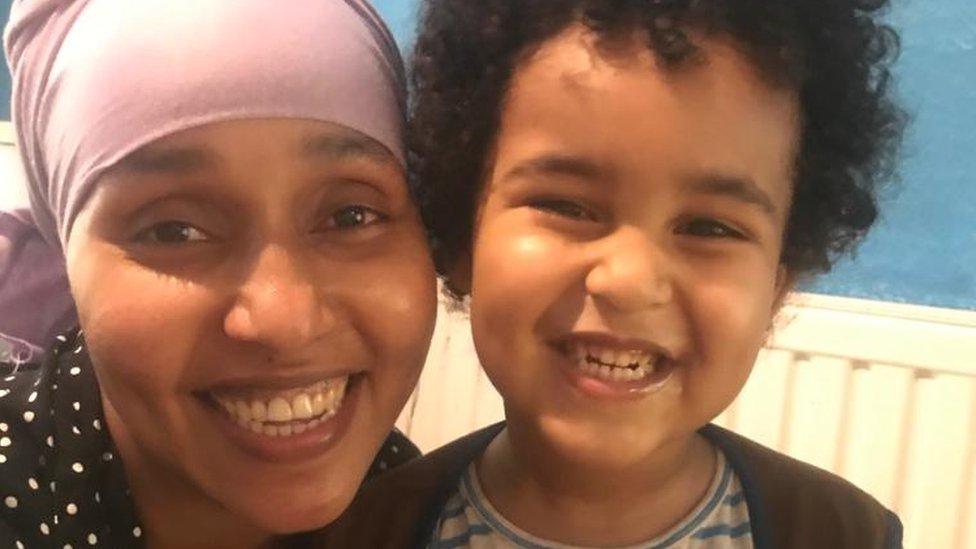
Anab Ahmed and her three children live in a one-bedroom flat
Figures suggest coronavirus is hitting deprived communities hardest, with cramped living conditions held up as one possible explanation. How are families in overcrowded housing coping with life in lockdown?
Anab Ahmed weeps as she recalls the moment her four-year-old son asked: "Do we live in prison, mummy?"
She told him no, they were not locked-up against their will. But she believes the truth is their life is "not different from the people who are in prison."
Things were tough before lockdown, she says, with four people sharing a one-bedroom flat where a mattress doubles as a dining table.
But her three children, all aged under five, were out of the house at nursery while she worked as a self-employed beautician. Weekends and evenings, weather permitting, would be spent in public playgrounds near their home in Plaistow, east London.
Now stuck indoors for most of the day, her son has begun to question why he doesn't have the simple things that some children take for granted - like his own room or a bed.
"He asks, 'why don't I have that?' That makes me cry. I feel so depressed," the 32-year-old says.
'Packed like sardines'
London is England's most overcrowded city, according to government figures, external.
But the problem spreads beyond the capital. Across the nation, about 788,000 households are classed as overcrowded, the English Housing Survey found, external.
Polly Neate, chief executive of housing charity Shelter, believes lockdown will be making things tougher for families "already desperately trying to keep their children happy and safe while packed like sardines" in overcrowded homes.
Anab is trying to limit her children's time outside, fearful of what would happen in such close quarters if one of them should fall ill. Her son's asthma adds to her anxieties.
"If I get sick I don't have any way to self-isolate myself from my children. If it happens, everyone will catch the virus," she says.
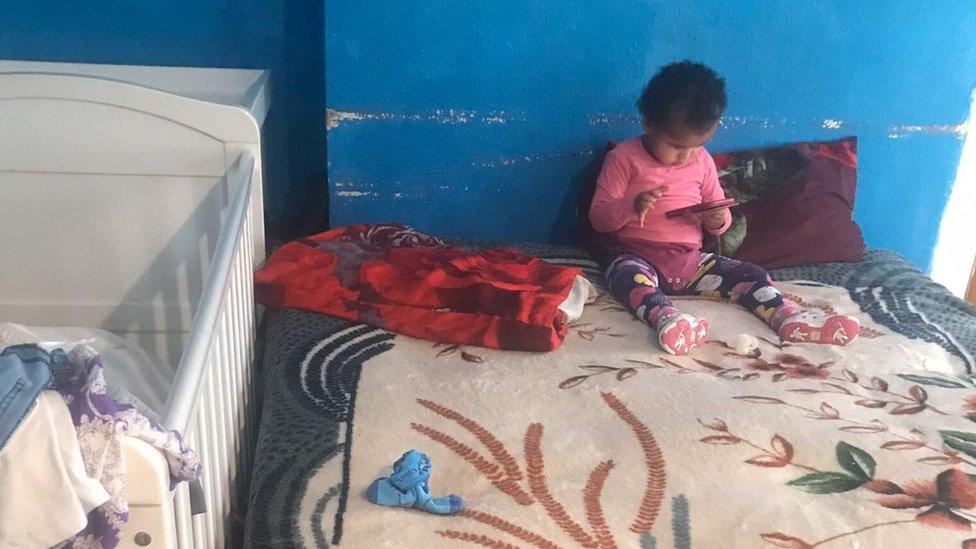
The family use a double bed as a dining table
The single mother says government advice - which recommends that, where possible, sick people use a different bathroom and do not share a bed with others - would be impossible to follow.
"I think I am someone who is left behind," she says on a video call while pacing around her flat.
Next to the bed she shares with her older two children, Anab pulls up a play mat, along with toys in a travel cot for the younger girl.
They have a blackboard and chalk for drawing, a TV and little else for entertainment. Tricycles and a pram lie unused, taking up valuable space. They have no garden to play in and no outside storage.
"[My children] have no physical movement and emotionally they are not happy," she says. "They look out the window at people walking through and ask me to take them outside."
Anab arrived in Britain in 2001 aged 13 having fled civil war in Somalia.
Her housing association home is in the borough of Newham, which, according to the 2011 Census, is the worst-affected area in the country. A quarter of households here are overcrowded.
'Same storm, different boat'
The council says it is at the "acute end of the housing crisis" and plans to build 1,000 council homes by 2022. It says it is working with landlords to identify vulnerable families and has so far made 15,000 welfare phone calls and issued 10,000 parcels of food, medicine and household essentials.
According to the Office for National Statistics (ONS), people in the most deprived areas of England are dying with Covid-19 at twice the rate as those in the least deprived areas. Newham has the highest rate of coronavirus-related deaths in the country., external
"We're all weathering the same storm with coronavirus, but we're not all in the same boat," says Helen Barnard, acting director of the Joseph Rowntree Foundation.
People in deprived areas are more likely to have public-facing jobs - increasing the risk of catching the virus - and live in overcrowded homes, making it hard to social distance and therefore "increasing the risk for whole families," she says.
It means the challenges of lockdown - like "turning our homes into offices, classrooms and spaces to exercise" - are magnified in already cramped conditions, says Ms Barnard.
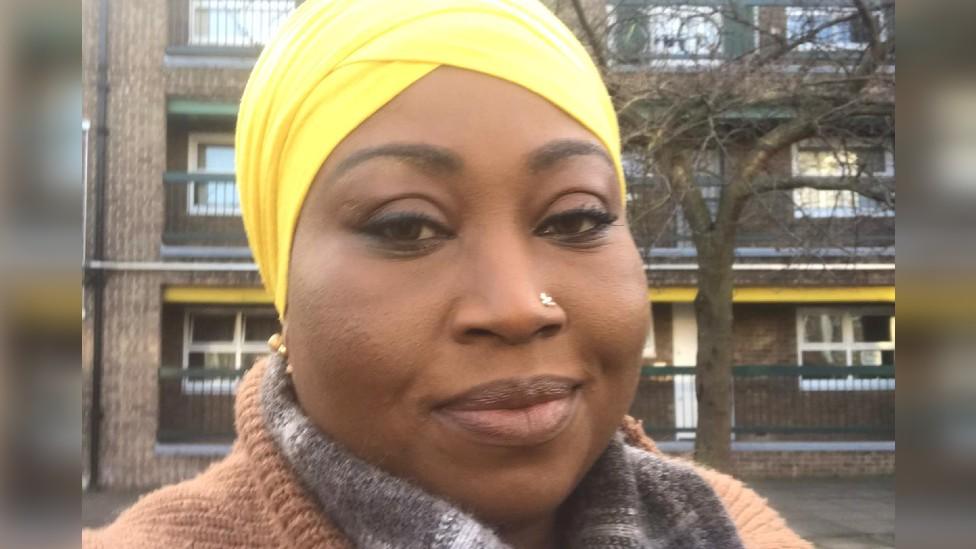
Olabisi Agbaje believes the government did not consider people in cramped conditions
You might also be interested in:
The effect of lockdown on Little America
The rise of the lockdown milkmen and women
Coronavirus: Single, pregnant and self-isolating
On the other side of the Thames, in Southwark, Olabisi Agbaje lives in a two-bedroom flat with her 14-year-old daughter and 12-year-old son. The children share a bunk bed in a room so small they cannot close the door.
After several weeks of lockdown, the reality of her children being cooped up indoors without the usual respite that school provides, became unbearable. She sent them to live with a sister who has a larger home with a garden in another part of London.
For the duration of lockdown she will be alone.
"It is hard to be away from them…[but] I have to think what is best for them," says Olabisi.
She believes the government has not considered people who live in social housing in densely-populated parts of the capital, where homes are often accessed via communal lifts and doorways.
Public Health England says self-isolation advice, external should still be followed "where possible", but points out that it was drawn-up before lockdown, with a focus on protecting asymptomatic family members who were free to come and go.
The government says councils are required to help people who are worried about self-isolation and overcrowding, via local health protection teams, external.
A spokesperson said that money to "help families in need to find safe and suitable accommodation" was included in a pot of £3.2bn made available to councils during the pandemic.
Southwark Council leader Peter John says the authority is "making every effort" to move vulnerable people, like rough sleepers and families in homeless hostels, to homes where they can self-isolate as a priority.
But he says a large number of "relatively less urgent overcrowded households" will also be relocated as usual "if they require an essential move".
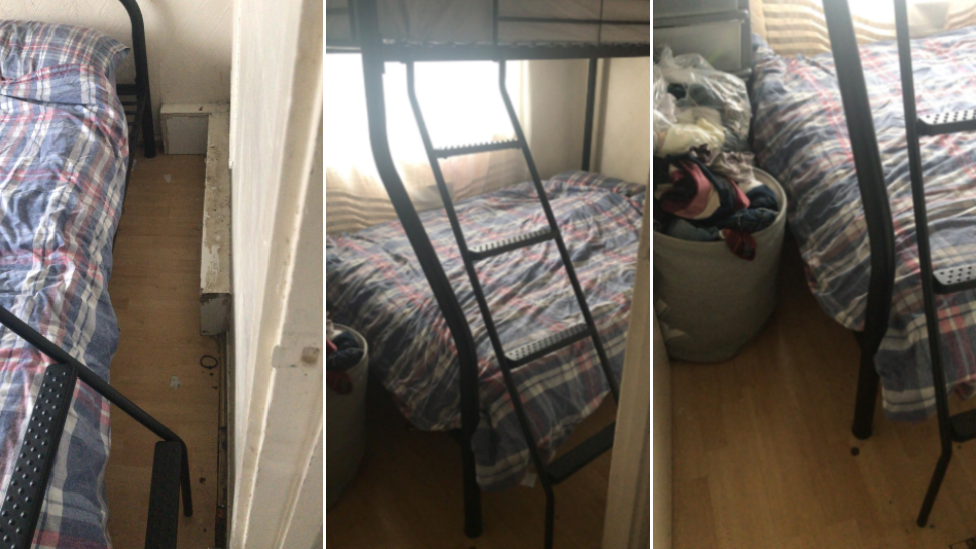
Olabisi Agbaje is unable to close the door to her children's cramped bedroom
Olabisi has already spent seven years on the council's waiting list.
"I'm a single mum and self-employed. There is no way I can afford to rent on the open market," she says. "We are at the mercy of the council."
The British Nigerian says it is the "sad reality" that many of those in similar situations to her are from ethnic minorities.
Some 15% of black African households are classified as overcrowded, as are just under a third of Bangladeshi households, according to government statistics, external.
For white British households, the figure is 2%.
Public Health England is reviewing the impact of coronavirus on ethnic minorities after data from the Intensive Care National Audit and Research Centre suggested they were being disproportionately affected.
Scientists have said there may be several factors at play, external, including that some groups are more likely to have pre-existing conditions like diabetes, or live in overcrowded housing - making it more difficult to social distance.
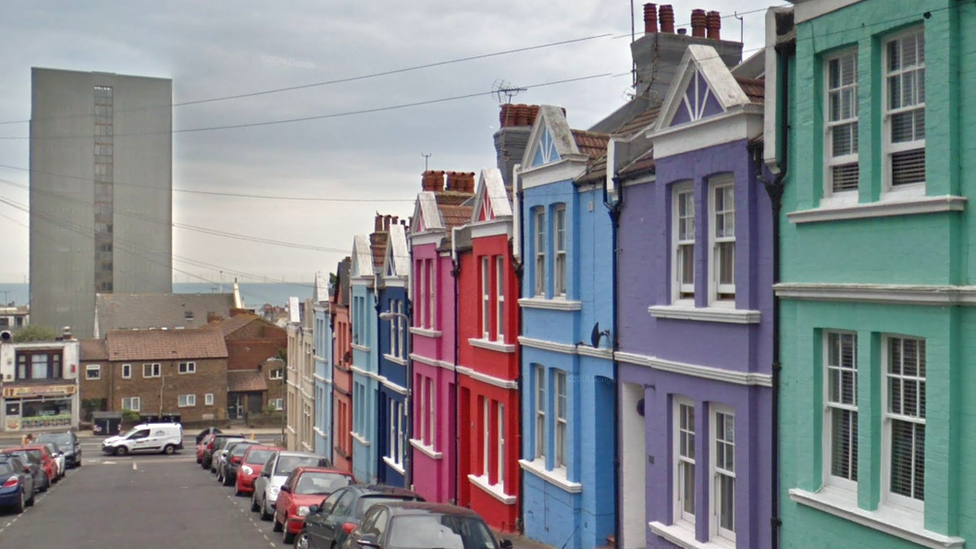
Thousands of households in Brighton are overcrowded
But it's not only London's ethnic minority communities who live in cramped conditions.
Kelly - not her real name - sleeps on a blow-up bed in the front room of the two-bedroom Brighton flat she shares with her three children, aged from two to 11.
More than 7,500 households are overcrowded in the seaside city, according to the 2011 Census.
Brighton and Hove City Council says it is committed to "improving the supply of affordable housing", with plans in place to build hundreds of new council homes.
For Kelly, the past few weeks have felt "suffocating".
She suffers from depression and anxiety, which have been put under "extra strain" - especially when school and nursery normally provide time and space for her to "recharge".
She worries, too, about the impact on her daughter, who she describes as having "autistic traits", and her son, who has asthma.
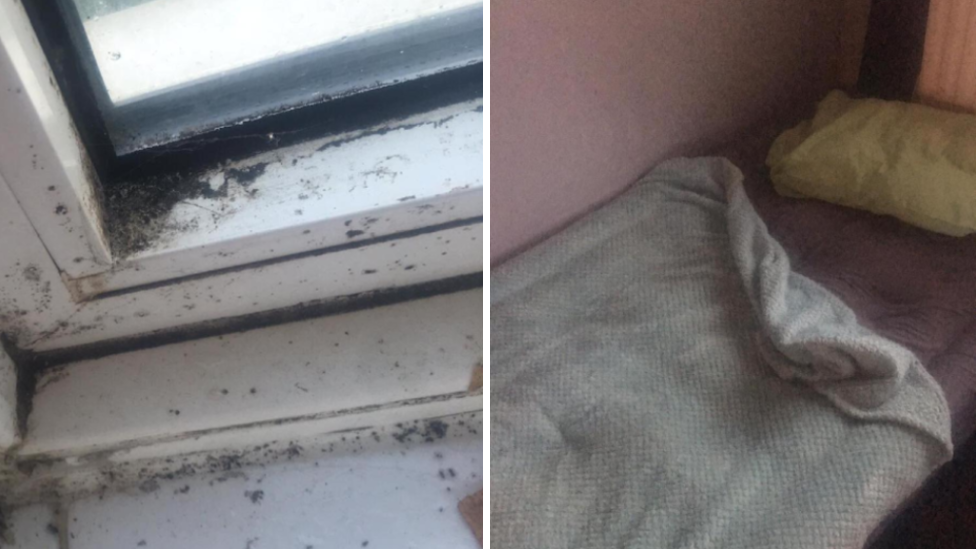
Mould on Kelly's window (left) and the blow-up bed she sleeps on in the front room
The ONS found that across England and Wales, children under the age of 15 are twice as likely to have some form of health problem if they live in overcrowded housing.
Monica Lakhanpaul, professor of integrated community child health at University College London (UCL), says cramped conditions could affect children's health in a number of ways, from a greater risk of asthma through exposure to damp and fungal spores, to developmental delays due to a lack of space to crawl or walk.
Other issues typically seen in children living in poverty - like malnutrition and vitamin D deficiency - are also influenced by overcrowding, she says.
All could be made worse by lockdown and will be harder for health professionals to identify during the crisis, she warns.
The government must also do more to consider the long-term impacts of lockdown, she says, suggesting children be screened for problems like malnutrition, tooth decay and speech delay once restrictions are eased.
PHE says there are no plans to implement mass-screening and it is confident in existing measures, which are run by the NHS.
But Prof Lakhanpaul says mobile units - similar to those used in countries that have experienced a humanitarian crisis like Sierra Leone - may be needed to catch up on "lost time".
"We are really going to have work very hard to reach out to people and bring the healthcare systems to them," she says.

A SIMPLE GUIDE: How do I protect myself?
AVOIDING CONTACT: The rules on self-isolation and exercise
HOPE AND LOSS: Your coronavirus stories
LOOK-UP TOOL: Check cases in your area
TESTING: Can I get tested for coronavirus?
